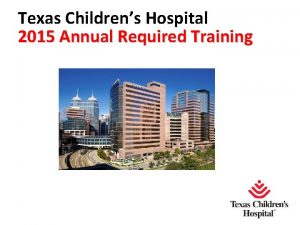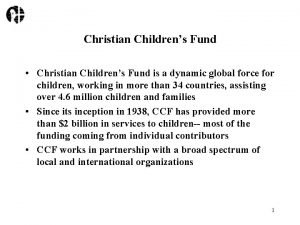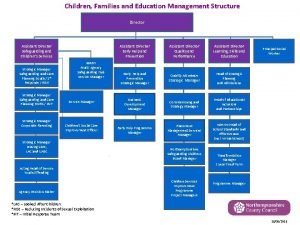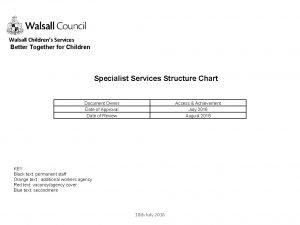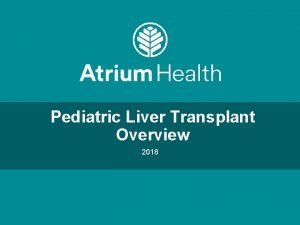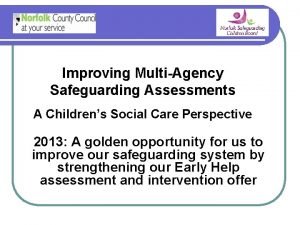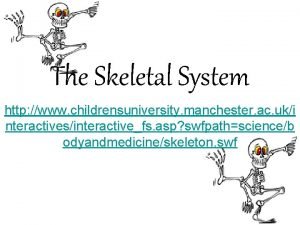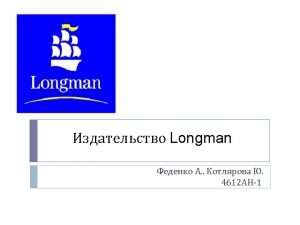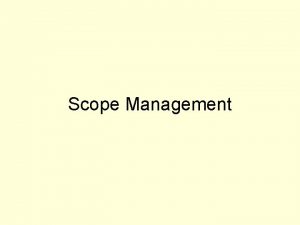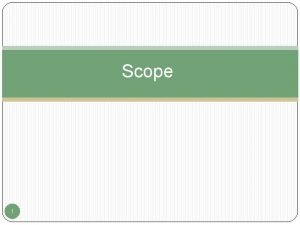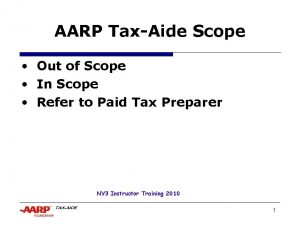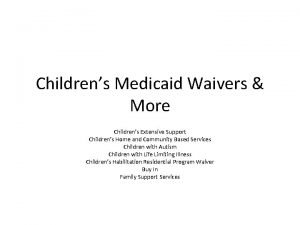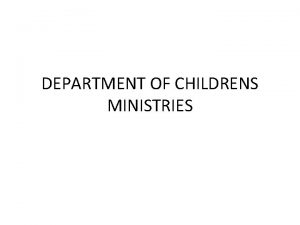Childrens Hospital School Hospital to Home Scope of











- Slides: 11

Children’s Hospital School Hospital to Home

Scope of Services – Hospital School • Batson Children’s Hospital School Program currently has (3) Special Education Teachers and (3) 504 Teachers that provide educational services that vary according to the types of disabilities, the ages, and the educational needs of the children served. • Children’s Hospital School operates on a schedule similar to public schools, based on Mississippi Department of Education requirements. The hospital school functions five days a week, for a full school year. Direct instruction is provided for 180 days and 7 days allocated for teacher preparation and inservice training opportunities, educational and consultative services are provided year round. • Staff available during the summer for records

Batson Children’s Hospital • We saw more than 150, 000 youngsters from all of Mississippi's 82 counties last year in our hospital, clinics and emergency room. • During the 2014 -2015 school year, there were 3, 270 Children’s Hospital admissions for students who qualified for hospital school services. Of those, 402 children had a special education ruling when they admitted and 385 were served through our 504 teachers. • Combined, our teachers: § Conducted over 4, 866 teaching sessions § Made 1, 351 school district contacts § Made over 1, 688 family contacts • During the 2014 -2015 school year, there were 1, 499 children between ages 3 and 21 admitted to the adult hospital. Teachers are consulted for services there.

Scope of Services • Patients served by the Children's Hospital School must meet one of the following criteria: • Have a current eligibility ruling for Special Education • 3 rd Day admission, must meet Child Find Guidelines and/or in the process of determining eligibility for Special Education services (with parental permission, the local education agency (school) is contacted and referral is made. If the patient is discharged, medical information is forwarded to the school. Hospital school personnel assist with assessment and data collection, at the school's request, during the inpatient stay at UMC (following MDE procedures for referral, assessment and placement procedures). • Referred through their multi-disciplinary team for the need of educational services or referral made by the child's physician after initial medical evaluation. • Are eligible for 504 services as a result of being restricted to the hospital for acute, chronic or terminal illness, accident or injury. With parental permission, referrals and information are sent to schools for those patients needing 504 services upon discharge. • Have outpatient clinic visits that are frequent and/or lengthy. For example, students receiving dialysis treatment 3 days per week as outpatients over a period of months, sporadically attend their local public school, if able or students receiving cancer treatments and cannot attend school during this period.

Floor Classroom AKU Unit Patient Room Office Batson Children’s Hospital School Staff provide services all over the hospital!!

Scope of Services – Early Intervention • Batson Children’s Hospital School Program currently has an Early Interventionist and a Service coordinator funded through the Department of Health that provide EI services to identify infants and toddlers (birth to 36 months) within the inpatient and outpatient hospital setting who have noted delays in their development, have conditions that indicate that future development will be affected or have risk factors. Once identified, UMMC-EIP begins the process of determining if the child qualifies for services under Part C of IDEA. • Qualifying medical conditions include: genetic disorders, neonatal infections, sensory impairments, severe orthopedic impairments, neurological disorders, brain hemorrhages, seizures, neurological disorders, mental/social/emotional health disorders, prenatal exposures to toxins, technology dependent, feeding problems, social impairments, and noted developmental delays. • Once eligibility is determined, each child is viewed individually within the program to determine current developmental needs and appropriate developmental services. For medically stable postterm infants and toddlers requiring prolonged hospitalization, emphasis will be placed on providing Multidisciplinary Developmental Assessments, Individualized Special Instruction, and interim Individualized Family Service Plans (IFSP). During the transition to home process, UMMC-EIP will refer these identified children to First Steps EIP and work closely with MSDH-EIP’s local Service Coordinators to help ensure that community-based services are seamless.

Early Intervention

Scope of Services – Children’s Hospital Program/Unit Number of Beds AKU Unit (Kidney Dialysis Unit) 8 Beds (currently expanding to 10) PICU – 1 st Floor 30 Beds, includes cardio Palliative Care & 2 nd Floor Children’s Transitional Care Unit 24 Beds, 4 of which live at Batson 3 rd Floor (Oncology, Blood Disorders, Seizures) 25 Beds 4 th & 5 th Floors (Isolation, Cardiac, Surgery) 51 Beds Adult Hospital & Cancer Clinic Varies with Admissions Children’s Rehabilitation Unit Trauma, Concussions & Transition 12 Current students Psychiatry Unit Early Childhood 12 Beds Varies with admissions Early Intervention NICU – 99 Beds Intermediate Care Nursery – 15 Beds Manning Clinic – averages 40 -50 weekly

Scope of Services – Focus on OHI “Other Health Impairment” is one of the 14 categories of disability listed in the Individuals with Disabilities Education Act (IDEA). Under IDEA, a child who has an “other health impairment” is very likely to be eligible for special services to help the child address his or her educational, developmental, and functional needs resulting from the disability. IDEA and MS states that: Other health impairment Other Health Impairment (OHI) means having limited strength, vitality or alertness, including a heightened alertness to environmental stimuli, that results in limited alertness with respect to the educational environment, that (A) is due to chronic or acute health problems such as asthma, attention deficit disorder (ADD) or attention deficit hyperactivity disorder (ADHD), diabetes, epilepsy, a heart condition, hemophilia, lead poisoning, leukemia, nephritis, rheumatic fever, sickle cell anemia, or Tourette Syndrome; and (B) adversely affects a child’s educational performance.

q By their very nature, other health impairments involve medical care and medical concerns. Children and youth with special health care needs face a continuum of changes throughout their lives, including moves between hospitals, home, schools, work or college, and from pediatric to adult health care. The amount of time that must be devoted to doctor visits, medical appointments, hospitalization, and seeing to the child’s well-being will depend greatly on the nature and severity of the child’s health impairment. For many families, the actual medical care of their child can be a daily, weekly, monthly challenge. q AKU q CCC q Initiatives q Medical Home/Coordinated Care q A medical home is not a house, office, or hospital, but rather an approach to providing comprehensive primary care q Cedar Rapids Community School District vs. Garrett F. q At issue is whether the IDEA requires the Cedar Rapids Community School District to provide Garret F. with continuous nursing services while he is in school. The district court 2 granted summary judgment in favor of Garret finding that the necessary services were not within the "medical services" exclusion of the IDEA, and therefore, were "related services" which the school district must provide.

q So……. How can we help you deal with the medical side of things? q. Hearing/Vision completed q. ROPO completed q. WIAT 3 administration q. Access to a multitude of medical records q. Attend local MET meetings q. Recommendation letter from physician, teacher, medical staff Let’s Discuss!!
 Moli texaschildrens
Moli texaschildrens The christian childrens fund
The christian childrens fund Childrens services
Childrens services Childrens services walsall
Childrens services walsall Levine childrens
Levine childrens 23 april international children's day turkey
23 april international children's day turkey Multi agency assessment
Multi agency assessment World literature quiz 22
World literature quiz 22 The childrens university of manchester
The childrens university of manchester Longman children's dictionary
Longman children's dictionary Black childrens memorial
Black childrens memorial Toddler temperature
Toddler temperature
